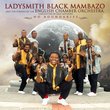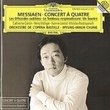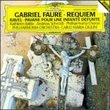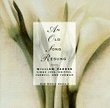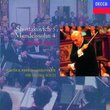| All Artists: Claudio Monteverdi, London Baroque, Charles Medlam, Nigel Rogers, Emma Kirkby, Mario Bolognesi, Rogers Covey-Crump, Catherine Denley, Jennifer Smith, Stephen Varcoe, Guillemette Laurens Title: Monteverdi: L'Orfeo / London Baroque - Medlam, Chiaroscuro - Caudle Members Wishing: 0 Total Copies: 0 Label: EMI Classics Release Date: 2/15/1994 Genre: Classical Styles: Opera & Classical Vocal, Historical Periods, Baroque (c.1600-1750) Number of Discs: 2 SwapaCD Credits: 2 UPCs: 077776494722, 077776494753, 077776494722 |
Search - Claudio Monteverdi, London Baroque, Charles Medlam :: Monteverdi: L'Orfeo / London Baroque - Medlam, Chiaroscuro - Caudle
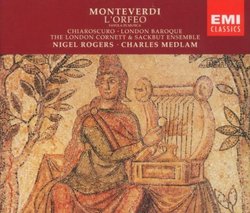 | Claudio Monteverdi, London Baroque, Charles Medlam Monteverdi: L'Orfeo / London Baroque - Medlam, Chiaroscuro - Caudle Genre: Classical This recording of Monteverdi's retelling of the Orpheus legend may not be as fine overall as John Eliot Gardiner's, but it has much to recommend it. Nigel Rogers was the first great modern Monteverdi tenor: he made this re... more » |
Larger Image |
CD DetailsSynopsis
Amazon.com This recording of Monteverdi's retelling of the Orpheus legend may not be as fine overall as John Eliot Gardiner's, but it has much to recommend it. Nigel Rogers was the first great modern Monteverdi tenor: he made this record after his prime (he no longer has the beautiful sound one wants from an Orfeo), but his virtuoso passage-work and stylish ornaments should be required listening for every student of the role. The cast, chorus, and orchestra give solid, if occasionally reserved, performances (though Guillemette Laurens is a shrill Messenger). The best singing of the entire record is (perhaps unfortunately) at the beginning: Emma Kirkby's sweet voice, imaginative embellishment, and eloquent delivery as Music result in absolutely the best rendition of the Prologue on record. --Matthew Westphal Similarly Requested CDs
|
CD ReviewsThe "professional" review is understated... Mark Singer | Columbia, MO | 04/16/2000 (5 out of 5 stars) "It's true that Roger's voice is close to being raw in some places, but I don't think that detracts in any way. There is much to recommend here, not the least being the very immediate sound of the recording and the broad dynamic range. It is easy to imagine this being sung in a small theater by a group of people who were not quite sure what they were making. Stephen Varcoe's Plutone is wonderfully rough, and another stand-out. I don't like opera as a rule, and I love this. [Added 2/18/2002: I'm sorry to see "limited availability" on this CD; get it while you can! One thing I didn't mention - the few times I have played this for other people, slipping it on during conversation, they typically stop talking as soon as Emma Kirkby begins singing the Prologue (is that what it's called? I've lost the booklet...), listen intently for a minute or so, and then say, "This is *beautiful*! What is it?" The only reply that fits is, "Perfect."]" Incredibly important work done superbly Craig Matteson | Ann Arbor, MI | 07/06/2002 (5 out of 5 stars) "This was the first great operatic work. It would have been performed in an intimate setting and that shows from the very beginning with the fanfare calling for the attention of the audience and the prologue transitioning the audience into the work. Certainly, that is a classic method of beginning a drama and was done all the time back then, but the reason they did it so much was because of the manner and place in which it was performed.There is so much to love in this recording and much of it has to do with Nigel Rogers. I love his voice and manner of singing. Some have problems with it, but I can't imagine a better "Vi ricord, o boschi amorosi". If you know of one, please email me.And I also worship at the altar of Emma Kirkby ever since I heard her live in Ann Arbor in 1980 (I was in the chorus and she was the soprano soloist in a revolutionary performance of "Messiah" that totaled about 50 performers including the orchestra).If you love ALL of opera I don't know why you wouldn't want this in your collection. Monteverdi is one of the great geniuses in all musical history and is the first great composer of opera and this is his first opera." Overshadowed, but great Caterina Sforza | Brooklyn, NY | 01/27/2005 (5 out of 5 stars) "This recording is overshadowed by Gardiner's, which soon followed; but while both are near-perfect, my heart just favors certain quirks of this one. Rogers's Orfeo is as virtuosic, assured and vulnerable as it can possibly be, and the rough patches in his voice do not in any way impair the musicality or beauty of his interpretation-- they enhance it, if anything, making a highly personal statement. I love the tempi here-- no dragging-- dance always hovering nearby. The ritornello and chorus of the spirits as Orfeo crosses to Hades are not lugubrious, but rather matter-of-fact, even jaunty. These spirits are interested observers-- but quite rightly, not emotionally overcome, as the lamenting nymphs and shepherds of Act II.
The playing and singing are splendid and expressive. The cast as accomplished and seasoned as Gardiner's, with such stalwarts as Covey-Crump, Thomas and Varcoe in prominent roles. I especially love little acoustic details, such as the receding sound of Orfeo's and Apollo's duet, as Orfeo is borne up to Olympus. Last but certainly not least, probably the best available rendering of "Possente Spirto" anywhere." |

